My Home Remedy- When Cough And Colds Strike
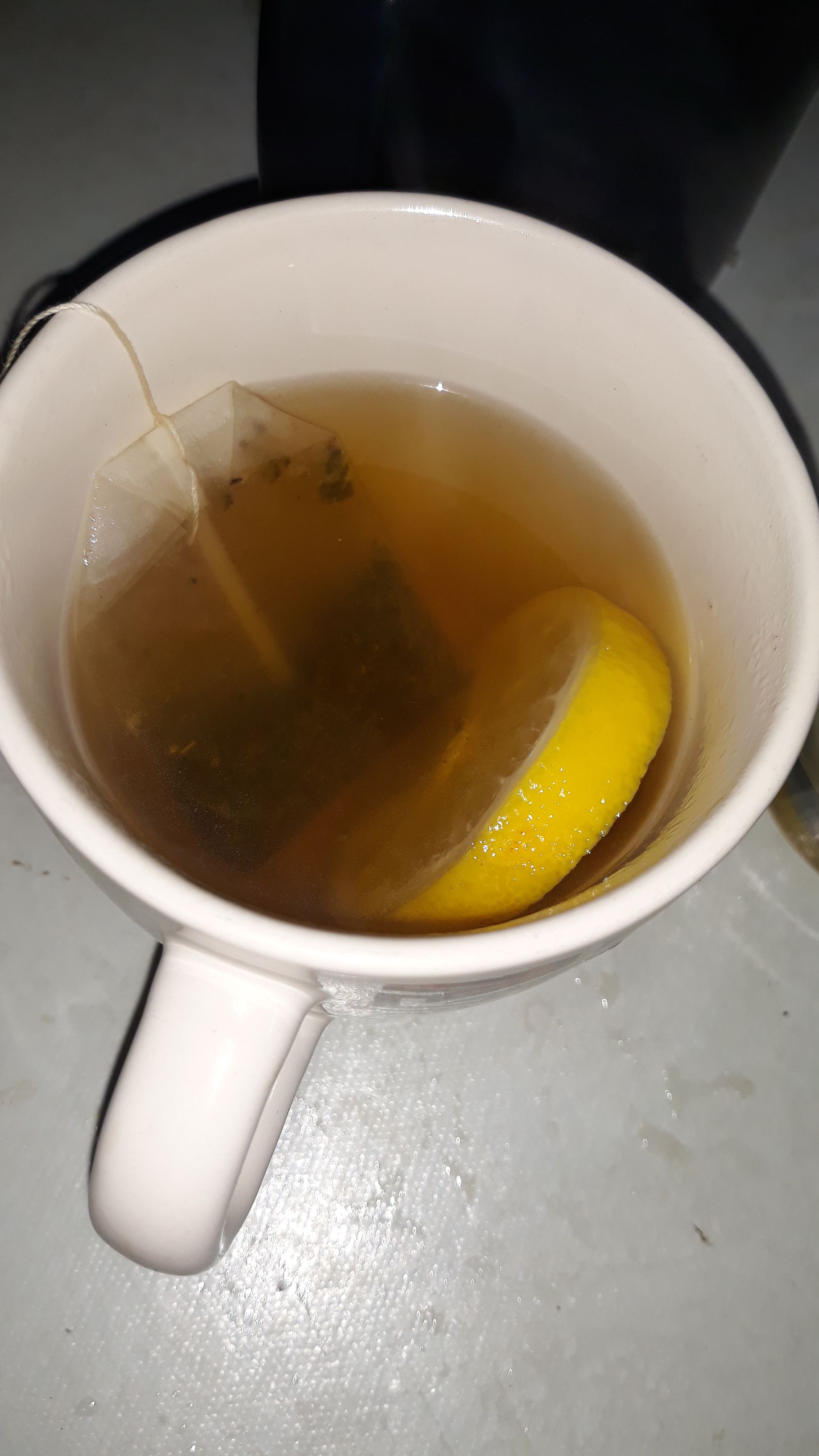 My favorite: green tea with lemon
My favorite: green tea with lemon
Homemade Ginger Twist Tea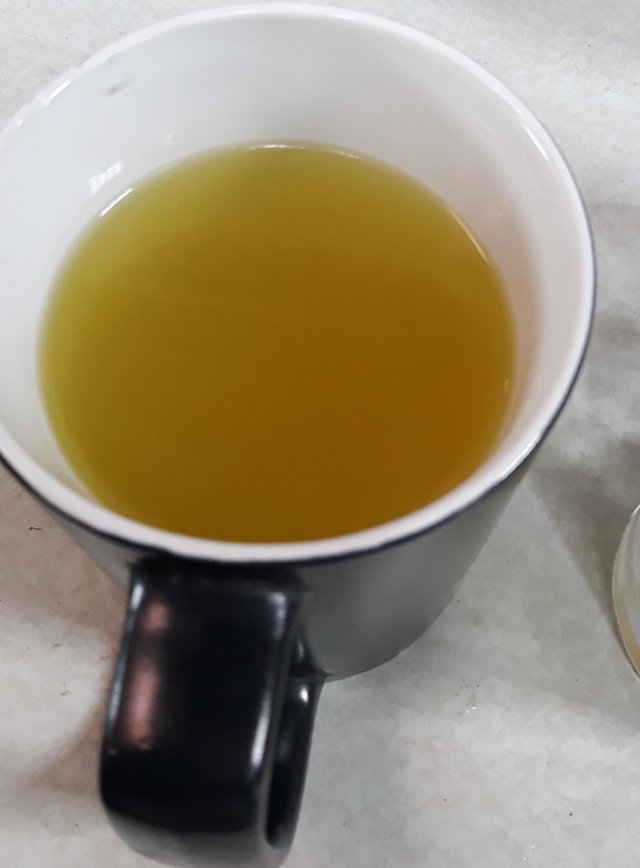
 Ginger, garlic, turmeric, lemon and oregano leaves + raw honey. These are among the nature's powerful antibiotic. This relieves my headache or migraine, coughs and colds. Im also giving this to my daughter and nephew everday instead of giving them softdrinks or juices with artificial flavoring, atleast this drink which they really love the taste, will boost their body's ability to fight any nasty bugs that comes their way and help them keep on top of their game all day long.
Ginger, garlic, turmeric, lemon and oregano leaves + raw honey. These are among the nature's powerful antibiotic. This relieves my headache or migraine, coughs and colds. Im also giving this to my daughter and nephew everday instead of giving them softdrinks or juices with artificial flavoring, atleast this drink which they really love the taste, will boost their body's ability to fight any nasty bugs that comes their way and help them keep on top of their game all day long.
The Ingredients And Few Facts about It

LEMON
Fast Facts About Lemons
Lemons are high in vitamin C,a powerful antioxidant. Vitamin C is needed to produce collagen, it may help relieve asthma symptoms, and it may protect against cancerLemon juice can be used in teas.
BENEFITS
Consuming a range of fruits and vegetables appears to reduce the risk of many lifestyle-related health conditions.
Lemons are a good source of vitamin C and of flavonoids, or antioxidants, which are thought to boost health and wellbeing in several ways.
Let's look at some of the possible benefits of consuming lemons.
1) Lowering stroke risk
According to the American Heart Association (AHA), citrus fruits may help lower the risk of ischemic stroke in women.
A study of data from nearly 70,000 women over 14 years showed that those who ate the most citrus fruits had a 19 percent lower risk of ischemic stroke than women who consumed the least.
Citrus fruits are a good source of flavonoids, which are thought to help protect against cancer and cardiovascular disease.
Ischemic stroke is the most common type of stroke. It is caused by a blood clot blocking the flow of blood to the brain.
2) Maintaining a healthy blood pressure
One Japanese study found that out of 101 women, those who walked regularly and consumed lemon every day had lower blood pressure than those who did not. The scientists called for more research to confirm this.
3) Cancer prevention
Lemons and lemon juice are an excellent source of the antioxidant vitamin C.
Antioxidants may help prevent the formation of free radicals that are known to cause cancer, although the exact role played by antioxidants in cancer prevention remains unclear.
4) Maintaining a healthy complexion
Vitamin C plays a vital role in the formation of collagen, the support system of the skin.
When eaten in its natural form or applied topically, vitamin C can help fight skin damage caused by the sun and pollution, reduce wrinkles, and improve overall skin texture, according to findings of a study on mice, published in 2014.
5) Preventing asthma
The risk of developing asthma appears to be lower in people who consume a high amount of certain nutrients, one of these being vitamin C, although further study is necessary.
A review published in Allergy, Asthma & Clinical Immunology found that vitamin C benefitted people with asthma and bronchial hypersensitivity when they also had a common cold.
The study concluded:
"It may be reasonable for asthmatic patients to test vitamin C on an individual basis if they have exacerbations of asthma caused by respiratory infections. More research on the role of vitamin C on common cold-induced asthma is needed."
6) Increasing iron absorption
Iron deficiency is one of the most common nutrient deficiencies in developed countries and a leading cause of anemia.
Pairing foods that are high in vitamin C with foods that are iron-rich maximizes the body's ability to absorb iron.
Spinach and chickpeas, for example, are good sources of iron. Squeezing a little lemon juice atop a salad with these ingredients can help maximize the intake of iron as well as vitamin C.
7) Boosting the immune system
Foods that are high in vitamin C and other antioxidants may help strengthen the immune system against the germs that cause cold and flu.
One study has indicated that, while vitamin C supplements do not appear the reduce the incidence of colds in a population, they may help reduce the duration of a cold. Vitamin C may also help boost immunity in people who are undergoing extreme physical activity.
Squeezing a whole lemon into a glass of hot water with a large spoonful of honey makes a soothing drink for someone a cough or cold.
8) Weight loss
One study, published in 2008, found that when rodents that received lemon phenols along with a high-fat diet for 12 weeks, they did not gain as much weight as rodents that did not receive the lemon-peel phenols. Lemon phenols are present in lemon peel.
However, whether this would have the same effect on humans is not clear.
Source: https://www.medicalnewstoday.com/articles/283476.php
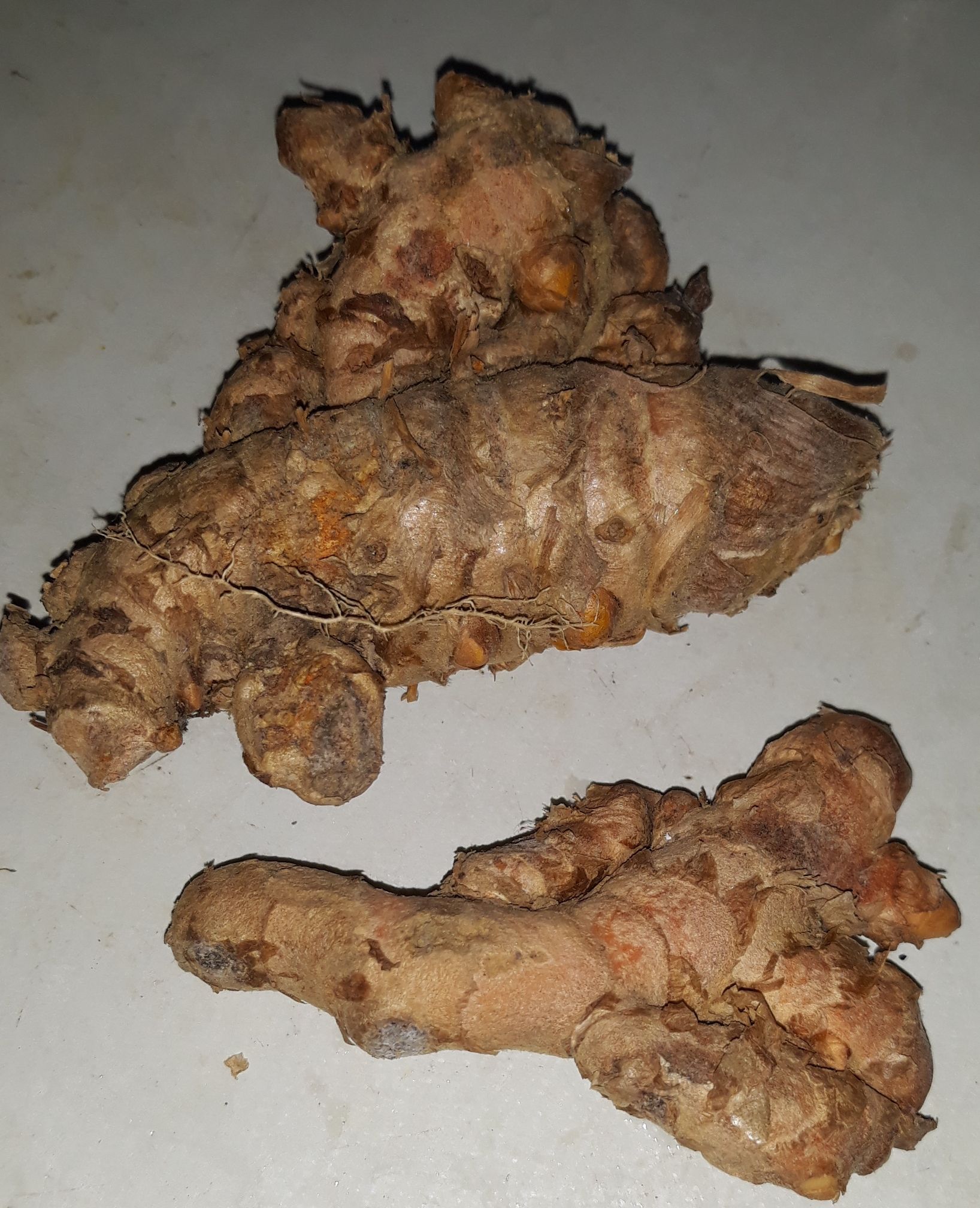
TURMERIC
Turmeric is a spice that comes from the turmeric plant. It is commonly used in Asian food. You probably know turmeric as the main spice in curry. It has a warm, bitter taste and is frequently used to flavor or color curry powders, mustards, butters, and cheeses. But the root of turmeric is also used widely to make medicine. It contains a yellow-colored chemical called curcumin, which is often used to color foods and cosmetics.Turmeric is used for arthritis, heartburn (dyspepsia), hoint pain,stomach pain, Crohn's disease and ulcerative colitis, bypass surgery, hemorrhage, diarrhea, intestinal gas, stomach bloating, loss of appetite, jaundice, liver problems, Helicobacter pylori (H. pylori) infection, stomach ulcers, irritable bowel syndrome (IBS), gallbladder disorders, high cholesterol, a skin condition called lichen planus, skin inflammation from radiation treatment, and fatigue.
It is also used for headaches, bronchitis, colds, lung infections, fibromyalgia, leprosy, fever, menstrual problems, itchy skin, recovery after surgery, and cancers. Other uses include depression, Alzheimer's disease, swelling in the middle layer of the eye (anterior uveitis), diabetes, water retention, worms, an autoimmune disease called systemic lupus erythematosus (SLE), tuberculosis, urinary bladder inflammation, and kidney problems.
Some people apply turmeric to the skin for pain, ringworm, sprains and swellings, bruising, leech bites, eye infections, acne, inflammatory skin conditions and skin sores, soreness inside of the mouth, infected wounds, and gum disease.
Turmeric is also used as an enema for people with inflammatory bowel disease.
In food and manufacturing, the essential oil of turmeric is used in perfumes, and its resin is used as a flavor and color component in foods.
Don't confuse turmeric with Javanese turmeric root (Curcuma zedoaria).
How does it work? Turmeric contains the chemical curcumin. Curcumin and other chemicals in turmeric might decrease swelling (inflammation). Because of this, turmeric might be beneficial for treating conditions that involve inflammation
Insufficient Evidence for:Alzheimer's disease
Early research shows that taking curcumin, a chemical found in turmeric, daily for 6 months does not benefit people with Alzheimer's disease. Eye inflammation (anterior uveitis)
Early research suggests that taking curcumin, a chemical found in turmeric, might improve symptoms of long-term inflammation in the middle layer of the eye.Colorectal cancer
Early research suggests that taking a specific turmeric product containing turmeric extract and Javanese turmeric extract (P54FP, Phytopharm plc., Godmanchester, United Kingdom) might stabilize some measures of colon cancer. There is also early evidence that taking curcumin, a chemical found in turmeric, daily for 30 days can reduce the number of precancerous glands in the colon of people at high risk of cancer.Bypass surgery (coronary artery bypass graft surgery)
Early research suggests that taking curcuminoids, which are chemicals found in turmeric, starting 3 days before surgery and continuing for 5 days after surgery can lower the risk of a heart attack following bypass surgery.Skin wounds related to cancer
Early research suggests that applying a turmeric ointment might help to relieve odor and itching caused by wounds associated with different types of cancer.A type of inflammatory bowel disease called Crohn's disease
Some evidence suggests that taking curcumin, a chemical found in turmeric, daily for one month can reduce bowel movements, diarrhea, and stomach pain in people with Crohn's disease.Depression
Early research suggests that taking curcumin, a chemical found in turmeric, twice daily for 6 weeks is as effective as the antidepressant medication fluoxetine in people with depression.Diabetes
Early research suggests that taking turmeric extract twice daily for 9 months can reduce the number of people with prediabetes who develop diabetes.Stomach upset (dyspepsia)
Some research shows that taking turmeric by mouth four times daily for 7 days might help improve an upset stomach.Gum disease (gingivitis)
Early research suggests that using a turmeric mouthwash is as effective as a drug-therapy mouthwash for reducing gum disease and bacteria levels in the mouth of people with gingivitis.Stomach ulcers caused by Helicobacter pylori (H pylori) infection
Early research suggests that taking turmeric daily for 4 weeks is less effective than conventional treatment for eliminating certain bacteria (H. pylori) that can cause stomach ulcers.Irritable bowel syndrome (IBS)
Early research suggests that taking a turmeric extract (Cynara Turmeric, Lchtwer Pharma) daily for 8 weeks reduces the occurrence of IBS in people with IBS who are otherwise healthy.Joint pain
Research shows that taking a specific combination product (Instaflex Joint Support, Direct Digital, Charlotte, NC) containing turmeric and other ingredients three times daily for 8 weeks reduces the severity of joint pain. But it does not appear to help joint stiffness or improve joint function.Skin rash (Lichen planus)
Taking a certain product (Curcumin C3 Complex, Sabinsa Corp) containing chemicals found in turmeric three times daily for 12 days can reduce skin irritation caused by lichen planus.Prostate cancer
Research suggests that taking a formula containing broccoli powder, turmeric powder, pomegranate whole fruit powder, and green tea extract three times daily for 6 months prevents an increase in prostate specific antigen (PSA) levels in men with prostate cancer. PSA levels are measured to monitor how well prostate cancer treatment is working. However, it's not yet known if this formula reduces the risk of prostate cancer progression or recurrence.Inflammation in the mouth and/or esophagus from radiation treatment
Early research suggests that swishing a turmeric solution in the mouth six times daily for 6 weeks reduces the risk of inflammation in the mouth and/or esophagus caused by radiation treatment in people with head and neck cancer.Rheumatoid arthritis (RA)
Early research suggests that curcumin, a chemical found in turmeric, might reduce some RA symptoms, including morning stiffness, walking time, and joint swelling. Other research shows that taking a turmeric product (BCM-95, Arjuna Natural Extracts, India) twice daily reduces RA symptoms more than conventional medication.Recover from surgery
Early research suggests that taking curcumin, a chemical found in turmeric, daily for up to one week after surgery can reduce pain, fatigue, and the need for pain medications.An inflammatory disease called systemic lupus erythematosus (SLE)
Early research suggests that taking turmeric by mouth three times daily for 3 months can reduce blood pressure and improve kidney function in people with kidney inflammation (lupus nephritis) caused by systemic lupus erythematosus.Tuberculosis
Early research suggests that taking a product containing turmeric and Tinospora cordifolia can reduce bacteria levels, improve wound healing, and reduce liver toxicity caused by antituberculosis therapy in people with tuberculosis who are receiving antituberculosis therapy.A type of inflammatory bowel disease called ulcerative colitis
Some early research suggests that taking curcumin, a chemical found in turmeric, daily for up to 6 months can reduce symptoms and the recurrence of ulcerative colitis when used in combination with conventional treatments. Other research shows that taking turmeric extract as an enema might help people with this condition.AcneJaundiceHepatitisDiarrheaFibromyalgiaLiver and gallbladder problemsHeadacheMenstrual problemsPainRingwormBruising
Other conditions. More evidence is needed to rate turmeric for these uses.
Alzheimer's disease
Early research shows that taking curcumin, a chemical found in turmeric, daily for 6 months does not benefit people with Alzheimer's disease.Eye inflammation (anterior uveitis)
Early research suggests that taking curcumin, a chemical found in turmeric, might improve symptoms of long-term inflammation in the middle layer of the eye.Colorectal cancer
Early research suggests that taking a specific turmeric product containing turmeric extract and Javanese turmeric extract (P54FP, Phytopharm plc., Godmanchester, United Kingdom) might stabilize some measures of colon cancer. There is also early evidence that taking curcumin, a chemical found in turmeric, daily for 30 days can reduce the number of precancerous glands in the colon of people at high risk of cancer.Bypass surgery (coronary artery bypass graft surgery)
Early research suggests that taking curcuminoids, which are chemicals found in turmeric, starting 3 days before surgery and continuing for 5 days after surgery can lower the risk of a heart attack following bypass surgery.Skin wounds related to cancer
Early research suggests that applying a turmeric ointment might help to relieve odor and itching caused by wounds associated with different types of cancer.A type of inflammatory bowel disease called Crohn's disease
Some evidence suggests that taking curcumin, a chemical found in turmeric, daily for one month can reduce bowel movements, diarrhea, and stomach pain in people with Crohn's disease.Depression
Early research suggests that taking curcumin, a chemical found in turmeric, twice daily for 6 weeks is as effective as the antidepressant medication fluoxetine in people with depression.Diabetes
Early research suggests that taking turmeric extract twice daily for 9 months can reduce the number of people with prediabetes who develop diabetes.Stomach upset (dyspepsia)
Some research shows that taking turmeric by mouth four times daily for 7 days might help improve an upset stomach.Gum disease (gingivitis)
Early research suggests that using a turmeric mouthwash is as effective as a drug-therapy mouthwash for reducing gum disease and bacteria levels in the mouth of people with gingivitis.Stomach ulcers caused by Helicobacter pylori (H pylori) infection
Early research suggests that taking turmeric daily for 4 weeks is less effective than conventional treatment for eliminating certain bacteria (H. pylori) that can cause stomach ulcers.Irritable bowel syndrome (IBS)
Early research suggests that taking a turmeric extract (Cynara Turmeric, Lchtwer Pharma) daily for 8 weeks reduces the occurrence of IBS in people with IBS who are otherwise healthy.Joint pain
Research shows that taking a specific combination product (Instaflex Joint Support, Direct Digital, Charlotte, NC) containing turmeric and other ingredients three times daily for 8 weeks reduces the severity of joint pain. But it does not appear to help joint stiffness or improve joint function.Skin rash (Lichen planus)
Taking a certain product (Curcumin C3 Complex, Sabinsa Corp) containing chemicals found in turmeric three times daily for 12 days can reduce skin irritation caused by lichen planus.Prostate cancer
Research suggests that taking a formula containing broccoli powder, turmeric powder, pomegranate whole fruit powder, and green tea extract three times daily for 6 months prevents an increase in prostate specific antigen (PSA) levels in men with prostate cancer. PSA levels are measured to monitor how well prostate cancer treatment is working. However, it's not yet known if this formula reduces the risk of prostate cancer progression or recurrence.Inflammation in the mouth and/or esophagus from radiation treatment
Early research suggests that swishing a turmeric solution in the mouth six times daily for 6 weeks reduces the risk of inflammation in the mouth and/or esophagus caused by radiation treatment in people with head and neck cancer.Rheumatoid arthritis (RA)
Early research suggests that curcumin, a chemical found in turmeric, might reduce some RA symptoms, including morning stiffness, walking time, and joint swelling. Other research shows that taking a turmeric product (BCM-95, Arjuna Natural Extracts, India) twice daily reduces RA symptoms more than conventional medication.Recover from surgery
Early research suggests that taking curcumin, a chemical found in turmeric, daily for up to one week after surgery can reduce pain, fatigue, and the need for pain medications.An inflammatory disease called systemic lupus erythematosus (SLE)
Early research suggests that taking turmeric by mouth three times daily for 3 months can reduce blood pressure and improve kidney function in people with kidney inflammation (lupus nephritis) caused by systemic lupus erythematosus.Tuberculosis
Early research suggests that taking a product containing turmeric and Tinospora cordifolia can reduce bacteria levels, improve wound healing, and reduce liver toxicity caused by antituberculosis therapy in people with tuberculosis who are receiving antituberculosis therapy.A type of inflammatory bowel disease called ulcerative colitis
Some early research suggests that taking curcumin, a chemical found in turmeric, daily for up to 6 months can reduce symptoms and the recurrence of ulcerative colitis when used in combination with conventional treatments. Other research shows that taking turmeric extract as an enema might help people with this condition.AcneJaundiceHepatitisDiarrheaFibromyalgiaLiver and gallbladder problemsHeadacheMenstrual problemsPainRingwormBruising
Other conditions. More evidence is needed to rate turmeric for these uses.
JaundiceHepatitisDiarrheaFibromyalgiaLiver and gallbladder problemsHeadacheMenstrual problemsPainRingwormBruising
Other conditions. More evidence is needed to rate turmeric for these uses.
HepatitisDiarrheaFibromyalgiaLiver and gallbladder problemsHeadacheMenstrual problemsPainRingwormBruising
Other conditions. More evidence is needed to rate turmeric for these uses.
DiarrheaFibromyalgiaLiver and gallbladder problemsHeadacheMenstrual problemsPainRingwormBruising
Other conditions. More evidence is needed to rate turmeric for these uses.
FibromyalgiaLiver and gallbladder problemsHeadacheMenstrual problemsPainRingwormBruising
Other conditions. More evidence is needed to rate turmeric for these uses.
HeadacheMenstrual problemsPainRingwormBruising
Other conditions. More evidence is needed to rate turmeric for these uses.
Menstrual problemsPainRingwormBruising
Other conditions. More evidence is needed to rate turmeric for these uses.
PainRingwormBruising
Other conditions. More evidence is needed to rate turmeric for these uses.
RingwormBruising
Other conditions. More evidence is needed to rate turmeric for these uses.
Bruising
Other conditions. More evidence is needed to rate turmeric for these uses.
Uses & Effectiveness?High cholesterol
Research suggests that taking turmeric extract by mouth twice daily for 3 months reduces total cholesterol, low-density lipoprotein (LDL or "bad") cholesterol, and triglycerides in overweight people with high cholesterol
Osteoarthritis
Some research shows that taking turmeric extracts, alone or in combination with other herbal ingredients, can reduce pain and improve function in people with osteoarthritis. In some research, turmeric worked about as well as ibuprofen for reducing osteoarthritis pain. However, it does not seem to work as well as diclofenac for improving pain and function in people with osteoarthritis.Itching (pruritus)
Research suggests that taking turmeric by mouth three times daily for 8 weeks reduces itching in people with long-term kidney disease. Also, early research suggests that taking a specific combination product (C3 Complex, Sami Labs LTD) containing curcumin plus black pepper or long pepper daily for 4 weeks reduces itching severity and improves quality of life in people with chronic itching caused by mustard gas.
High cholesterol
Research suggests that taking turmeric extract by mouth twice daily for 3 months reduces total cholesterol, low-density lipoprotein (LDL or "bad") cholesterol, and triglycerides in overweight people with high cholesterolOsteoarthritis
Some research shows that taking turmeric extracts, alone or in combination with other herbal ingredients, can reduce pain and improve function in people with osteoarthritis. In some research, turmeric worked about as well as ibuprofen for reducing osteoarthritis pain. However, it does not seem to work as well as diclofenac for improving pain and function in people with osteoarthritis.Itching (pruritus)
Research suggests that taking turmeric by mouth three times daily for 8 weeks reduces itching in people with long-term kidney disease. Also, early research suggests that taking a specific combination product (C3 Complex, Sami Labs LTD) containing curcumin plus black pepper or long pepper daily for 4 weeks reduces itching severity and improves quality of life in people with chronic itching caused by mustard gas.
Possibly Ineffective for:
Stomach ulcers
Some research suggests that taking turmeric three times daily for 8 weeks does not improve stomach ulcers. Also, taking powdered turmeric four times daily for 6 weeks seems to be less effective than taking a conventional antacid.Turmeric is POSSIBLY SAFE when it is used as an enema or a mouthwash in the short-term.
Turmeric usually does not cause significant side effects; however, some people can experience stomach upset, nausea, dizziness, or diarrhea.
In one report, a person who took very high amounts of turmeric, over 1500 mg twice daily, experienced a dangerous abnormal heart rhythm. However, it is unclear if turmeric was the actual cause of this side effect. Until more is known, avoid taking excessively large doses of turmeric.
Special Precautions & Warnings:Pregnancy and breast-feeding:
During pregnancy and while breast-feeding, turmeric is LIKELY SAFE when taken by mouth in amounts commonly found in food. However, turmeric is LIKELY UNSAFE when taken by mouth in medicinal amounts during pregnancy. It might promote a menstrual period or stimulate the uterus, putting the pregnancy at risk. Do not take medicinal amounts of turmeric if you are pregnant. There is not enough information to rate the safety of medicinal amounts of turmeric during breast-feeding. It is best not to use it.
Gallbladder problems:
Turmeric can make gallbladder problems worse. Do not use turmeric if you have gallstones or a bile duct obstruction.
Bleeding problems:
Taking turmeric might slow blood clotting. This might increase the risk of bruising and bleeding in people with bleeding disorders.
Diabetes:
Curcumin, a chemical in turmeric, might decrease blood sugar in people with diabetes. Use with caution in people with diabetes as it might make blood sugar too low.
A stomach disorder called gastroesophageal reflux disease (GERD):
Turmeric can cause stomach upset in some people. It might make stomach problems such as GERD worse. Do not take turmeric if it worsens symptoms of GERD.
Hormone-sensitive condition such as breast cancer, uterine cancer, ovarian cancer, endometriosis, or uterine fibroids:
Turmeric contains a chemical called curcumin, which might act like the hormone estrogen. In theory, turmeric might make hormone-sensitive conditions worse. However, some research shows that turmeric reduces the effects of estrogen in some hormone-sensitive cancer cells. Therefore, turmeric might have beneficial effects on hormone-sensitive conditions. Until more is known, use cautiously if you have a condition that might be made worse by exposure to hormones.
Infertility:
Turmeric might lower testosterone levels and decrease sperm movement when taken by mouth by men. This might reduce fertility. Turmeric should be used cautiously by people trying to have a baby.
Iron deficiency:
Taking high amounts of turmeric might prevent the absorption of iron. Turmeric should be used with caution in people with iron deficiency.
Surgery:
Turmeric might slow blood clotting. It might cause extra bleeding during and after surgery. Stop using turmeric at least 2 weeks before a scheduled surgery.
Pregnancy and breast-feeding:
During pregnancy and while breast-feeding, turmeric is LIKELY SAFE when taken by mouth in amounts commonly found in food. However, turmeric is LIKELY UNSAFE when taken by mouth in medicinal amounts during pregnancy. It might promote a menstrual period or stimulate the uterus, putting the pregnancy at risk. Do not take medicinal amounts of turmeric if you are pregnant. There is not enough information to rate the safety of medicinal amounts of turmeric during breast-feeding. It is best not to use it.Gallbladder problems:
Turmeric can make gallbladder problems worse. Do not use turmeric if you have gallstones or a bile duct obstruction.Bleeding problems:
Taking turmeric might slow blood clotting. This might increase the risk of bruising and bleeding in people with bleeding disorders.Diabetes:
Curcumin, a chemical in turmeric, might decrease blood sugar in people with diabetes. Use with caution in people with diabetes as it might make blood sugar too low.A stomach disorder called gastroesophageal reflux disease (GERD):
Turmeric can cause stomach upset in some people. It might make stomach problems such as GERD worse. Do not take turmeric if it worsens symptoms of GERD.Hormone-sensitive condition such as breast cancer, uterine cancer, ovarian cancer, endometriosis, or uterine fibroids:
Turmeric contains a chemical called curcumin, which might act like the hormone estrogen. In theory, turmeric might make hormone-sensitive conditions worse. However, some research shows that turmeric reduces the effects of estrogen in some hormone-sensitive cancer cells. Therefore, turmeric might have beneficial effects on hormone-sensitive conditions. Until more is known, use cautiously if you have a condition that might be made worse by exposure to hormones.Infertility:
Turmeric might lower testosterone levels and decrease sperm movement when taken by mouth by men. This might reduce fertility. Turmeric should be used cautiously by people trying to have a baby.Iron deficiency:
Taking high amounts of turmeric might prevent the absorption of iron. Turmeric should be used with caution in people with iron deficiency.Surgery:
Turmeric might slow blood clotting. It might cause extra bleeding during and after surgery. Stop using turmeric at least 2 weeks before a scheduled surgery.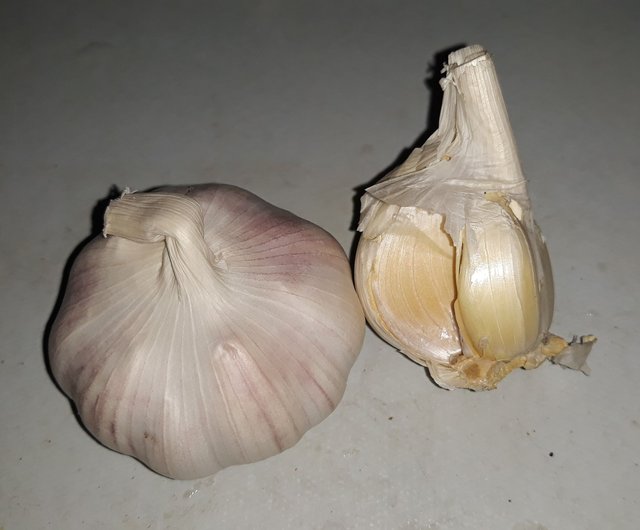
GARLIC
Here are 11 health benefits of garlic that are supported by human research studies.1. Garlic Contains a Compound Called Allicin, Which Has Potent Medicinal Properties
Garlic is a plant in the Allium (onion) family.
It is closely related to onions, shallots and leeks.
It grows in many parts of the world and is a popular ingredient in cooking due to its strong smell and delicious taste.
However, throughout ancient history, the main use of garlic was for its health and medicinal properties.
Its use was well documented by all the major civilizations... including the Egyptians, Babylonians, Greeks, Romans and the Chinese.
The entire "head" is called a garlic bulb, while each segment is called a clove. There are about 10-20 cloves in a single bulb, give or take.
We now know that most of the health effects are caused by one of the sulfur compounds formed when a garlic clove is chopped, crushed or chewed.
This compound is known as allicin, and is also responsible for the distinct garlic smell.
Allicin enters the body from the digestive tract and travels all over the body, where it exerts its potent biological effects (which we'll get to in a bit).
2. Garlic Is Highly Nutritious, But Has Very Few Calories
Garlic is low in calories and very rich in Vitamin C, Vitamin B6 and Manganese. It also contains trace amounts of various other nutrients3. Garlic Can Combat Sickness, Including the Common Cold
Garlic supplementation helps to prevent and reduce the severity of common illnesses like the flu and common cold.
4. The Active Compounds in Garlic Can Reduce Blood Pressure
High doses of garlic appear to improve blood pressure of those with known high blood pressure (hypertension). In some instances, supplementation can be as effective as regular medications.
5. Garlic Improves Cholesterol Levels, Which May Lower the Risk of Heart Disease
Garlic supplementation seems to reduce total and LDL cholesterol, particularly in those who have high cholesterol. HDL cholesterol and triglycerides do not seem to be affected.
6. Garlic Contains Antioxidants That May Help Prevent Alzheimer's Disease and Dementia
Garlic contains antioxidants that protect against cell damage and ageing. It may reduce the risk of Alzheimer's disease and dementia.
7. Garlic May Help You Live Longer
Garlic has known beneficial effects on common causes of chronic disease, so it makes perfect sense that it could help you live longer.
8. Athletic Performance Can Be Improved With Garlic Supplementation
Garlic can improve physical performance in lab animals and people with heart disease. Benefits in healthy people are not yet conclusive.
9. Eating Garlic Can Help Detoxify Heavy Metals in the Body
Garlic was shown to significantly reduce lead toxicity and related symptoms in one study.
10. Garlic May Improve Bone Health
Garlic appears to have some benefits for bone health by increasing estrogen levels in females, but more human studies are needed.
11. Garlic Is Easy to Include in Your Diet and Tastes Absolutely Delicious
The last one is not a health benefit, but still important.It is the fact that it is very easy (and delicious) to include garlic in your current diet.
It complements most savory dishes, particularly soups and sauces. The strong taste of garlic can also add a punch to otherwise bland recipes.
Garlic comes in several forms, from whole cloves and smooth pastes to powders and supplements like garlic extract and garlic oil.
The minimum effective dose for therapeutic effects is one clove eaten with meals, two or three times a day.
However, keep in mind that there are some downsides to garlic, such as bad breath. There are also some people who are allergic to it.
If you have a bleeding disorder or are taking blood thinning medications, then talk to your doctor before increasing your garlic consumption.
The active compound allicin only forms when garlic is crushed or cleaved when it is raw. If you cook it before crushing it, then it won't have the same health effects.
Therefore, the best way to consume garlic is raw, or to crush and cut it and leave it out for a while before you add it to your recipes.
Source: https://www.healthline.com/nutrition/11-proven-health-benefits-of-garlic
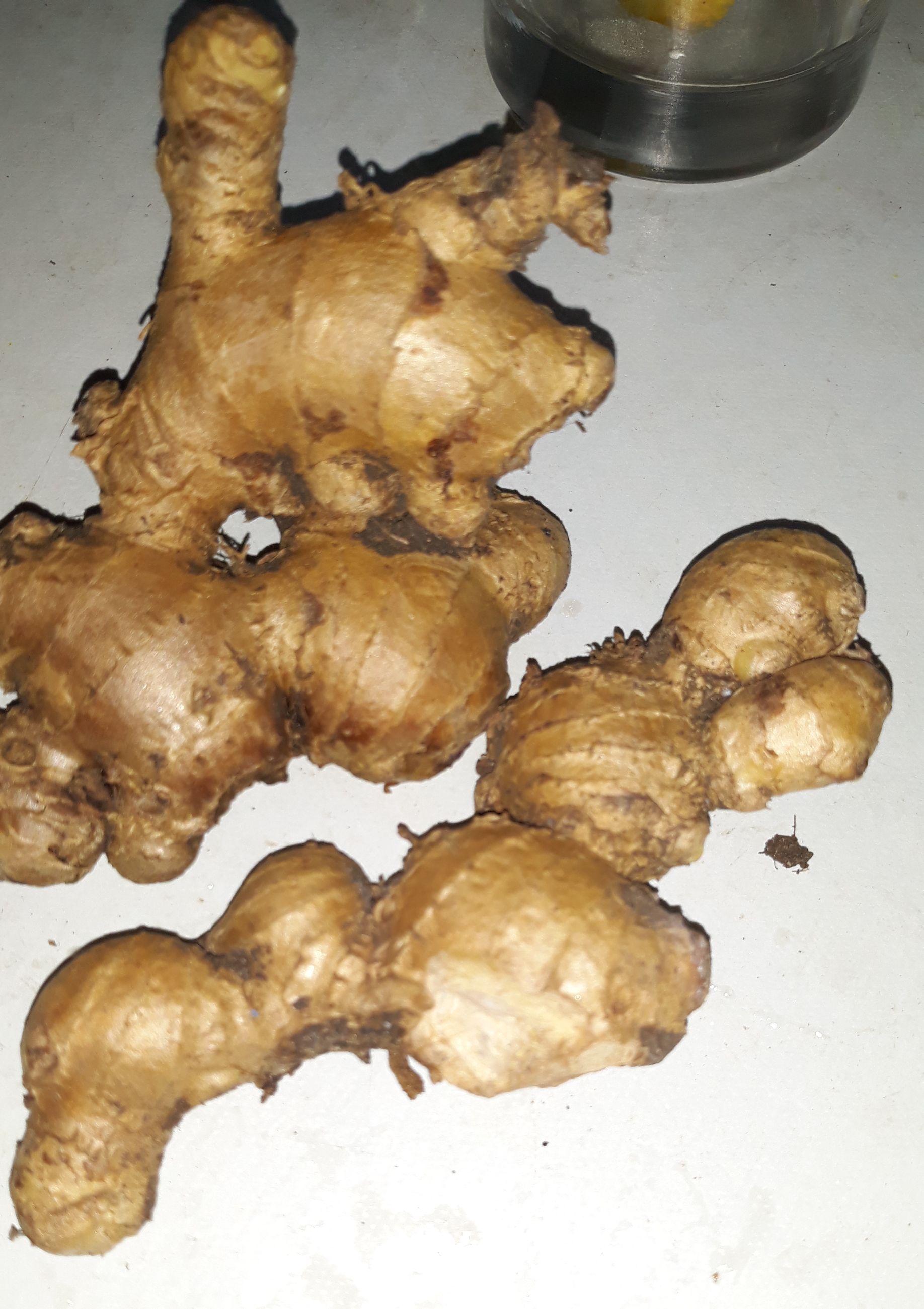
GINGER
Scientific analysis shows that ginger contains hundreds of compounds and metabolites, some of which may contribute to health and healing. Of these, the gingerols and shogaols have been most extensively researched.
1. Digestion
The phenolic compounds in ginger are known to help relieve gastrointestinal (GI) irritation, stimulate saliva and bile production, and suppress gastric contractions as food and fluids move through the GI tract.
At the same time, ginger also appears to have beneficial effects on the enzymes trypsin and pancreatic lipase, and to increase motility through the digestive tract. This suggests ginger could help prevent colon cancer and constipation.
2. Nausea
Chewing raw ginger or drinking ginger tea is a common home remedy for nausea during cancer treatment.
Taking ginger for motion sickness seems to reduce feelings of nausea, but it does not appear to prevent vomiting.
Ginger is safe to use during pregnancy, to relieve nausea. It is available in the form of ginger lozenges or candies.
3. Cold and flu relief
During cold weather, drinking ginger tea is good way to keep warm. It is diaphoretic, which means that it promotes sweating, working to warm the body from within.
To make ginger tea at home, slice 20 to 40 grams (g) of fresh ginger and steep it in a cup of hot water. Adding a slice of lemon or a drop of honey adds flavor and additional benefits, including vitamin C and antibacterial properties.
This makes a soothing natural remedy for a cold or flu.
4. Pain reduction
A study involving 74 volunteers carried out at the University of Georgia found that daily ginger supplementation reduced exercise-induced muscle pain by 25 percent.
Ginger has also been found to reduce the symptoms of dysmenorrhea, the severe pain that some women experience during a menstrual cycle.
5. Inflammation
Ginger has been used for centuries to reduce inflammation and treat inflammatory conditions.
A study published in Cancer Prevention Research journal reported that ginger supplements, which are available to buy online, reduced the risk of colorectal cancer developing in the bowel of 20 volunteers.
Ginger has also been found to be "modestly efficacious and reasonably safe" for treating inflammation associated with osteoarthritis.
6. Cardiovascular health
Other possible uses include reducing cholesterol, lowering the risk of blood clotting, and helping to maintain healthy blood sugar levels. More research is needed, but if proven, ginger could become part of a treatment for heart disease and diabetes.
Nutrition
Ginger provides a variety of vitamins and minerals:
In 100 grams (g) of fresh ginger root, there are:
79 calories
17.86 g of carbohydrate
3.6 g of dietary fiber
3.57 g of protein
0 g of sugar
14 mg of sodium
1.15 g of iron
7.7 mg of vitamin C
33 mg of potassium
Other nutrients found in ginger in ginger are:
vitamin B6
magnesium
phosphorus
zinc
folate
riboflavinniacin
Fresh or dried ginger can be used to flavor foods and drinks without adding unnecessary salt or sugar. Since it is often consumed in such small amounts, ginger does not add significant quantities of calories, carbohydrate, protein, or fiber.
Diet
Ginger tea with lemon and honey can be a soothing cold remedy.
Other anti-inflammatory and antioxidant compounds found in ginger that that are beneficial to health include gingerols, beta-carotene, capsaicin, caffeic acid, curcumin and salicylate.
Ginger pairs well with many different types of seafood, oranges, melon, pork, chicken, pumpkin, rhubarb, and apples, to name a few. When buying fresh ginger, look for a root with smooth, taut skin, with no wrinkles, and a spicy aroma.
Store fresh ginger in a tightly wrapped plastic bag in the refrigerator or freezer, and peel and grate it before use. Add it to any suitable dish for extra flavor.
If fresh ginger is not available, you can use dried.
In most recipes, one-eighth of a teaspoon of ground ginger can be substituted for one tablespoon of fresh grated ginger. Ground ginger can be found in the herbs and spices section of most grocery stores.
The United States (U.S.) Food and Drug Administration (FDA) consider ginger to be a food additive that is "generally recognized as safe."
Natural ginger will cause little or no known side effects for most people. In some, however, a high intake may worsen symptoms of acid reflux, irritate the mouth, and cause diarrhea. Taking ginger as capsules may help reduce the risk of heartburn.
The effectiveness and side effects from ginger supplements will vary by brand and formulation, but people are advised not to take more than 4 g of dried ginger a day, or 1 g during pregnancy, including food sources. Scientists urge caution when using supplements, as these are not standardized.
Anyone who is pregnant, or who has gallstones, diabetes, or a blood clotting disorder should discuss first with their doctor whether to increase their intake of ginger. Ginger supplements should not be used with aspirin or other blood-thinning medications.
Scientists note that many of the compounds in ginger have not been fully investigated, and not all of the claims for ginger have been supported by research. However, many of those that have been studied appear to show promise for medicinal purposes.
It is better to seek dietary sources of nutrients rather than supplements, and to consume them as part of an overall diet, rather than focusing on one item.
Source: https://www.medicalnewstoday.com/articles/265990.php

OREGANO LEAVES
The Top Health Benefits of Oregano
1. Antioxidants for Immune System Support
One active agent in oregano is rosmarinic acid, which is a strong antioxidant that may support immune system health. Oregano has one of the highest antioxidant activity ratings, with 42 times the antioxidant punch of apples. According to one study:
"…intake of herbs [including oregano] may…contribute significantly to the total intake of plant antioxidants, and be an even better source of dietary antioxidants than many other food groups such as fruits, berries, cereals, and vegetables."
2. Antifungal, Antibacterial, and May Even Kill MRSA
Carvacol and thymol, two phytochemicals in oregano, are powerful antimicrobials. Research has shown essential oils from oregano may kill the foodborne pathogen Listeria and the superbug MRSA (making it a useful addition to hand soaps and disinfectants). According to one of the researchers involved in the MRSA study:
"We have done a few preliminary tests and have found that the essential oil from the oregano kills MRSA at a dilution 1 to 1,000. The tests show that the oil kills MRSA both as a liquid and as a vapor and its antimicrobial activity is not diminished by heating in boiling water."
Studies have also found essential oils of oregano to be useful against certain Candida species.
3. Anti-inflammatory Properties
Oregano contains beta-caryophyllin (E-BCP), a substance that inhibits inflammation and may also be beneficial for conditions including osteoporosis and arteriosclerosis, as well as metabolic syndrome.
4. Useful for Upper Respiratory Infections
Oregano also has potential anti-viral activity, and a spray containing aromatic essential oils from five plants, including oregano, was found to significantly relieve symptoms "immediately" in those with upper respiratory infections.
If you come down with a cold or the flu, oregano oil can also be useful. Generally, the higher the carvacrol concentration, the more effective it is. Interestingly, oregano encourages sweat production as a mode of detox, and ingesting it may help your body to get rid of unwanted phlegm in your lungs.
5. Cancer-Fighting Effects
Oregano extract has been shown to "lead to growth arrest and cell death in a dose- and time-dependent manner" in colon cancer cells. A phytochemical in oregano, carnosol, has also been "evaluated for anti-cancer property in prostate, breast, skin, leukemia, and colon cancer with promising results."
Source: https://articles.mercola.com/sites/articles/archive/2014/02/01/oregano-health-benefits.aspx

HONEY
Health Benefits of Honey
Since ancient times, honey has been used as both a food and a medicine.It's very high in beneficial plant compounds, and offers several health benefits.
Honey is particularly healthy when used instead of refined sugar, which is 100% empty calories.
Here are the top 10 health benefits of honey that are supported by science.
1. Honey Contains Some Nutrients
Honey is a sweet, thick liquid made by honeybees.
The bees swarm their environment and collect the sugar-rich nectar of flowers.
Then inside the beehive, they repeatedly consume, digest and regurgitate ("vomit") the nectar.
The end product is honey, a liquid that is supposed to serve as stored food for the bees. The smell, color and taste depend on the types of flowers the bees visit.
Nutritionally, 1 tablespoon of honey (21 grams) contains 64 calories and 17 grams of sugar, including fructose, glucose, maltose and sucrose.
It contains virtually no fiber, fat or protein.
It also contains trace amounts (under 1% of RDA) of several vitamins and minerals, but you would have to eat many pounds to fulfill your daily requirements.
Where honey shines is in its content of bioactive plant compounds and antioxidants. Darker types tend to be even higher in these compounds than lighter types.
BOTTOM LINE:Honey is thick, sweet liquid made by honeybees. It is low in vitamins and minerals, but may be high in some plant compounds.
2. High-Quality Honey Is Rich in Antioxidants
High-quality honey contains many important antioxidants. These includes phenols, enzymes and compounds like flavonoids and organic acids.
Scientists believe that it is the combination of these compounds that gives honey its antioxidant power.
Interestingly, two studies have shown that buckwheat honey increases the antioxidant value of the blood.
Antioxidants have been linked to reduced risk of heart attacks, strokes and some types of cancer. They may also promote eye health.
BOTTOM LINE:Honey contains a number of antioxidants, including phenolic compounds like flavonoids.
3. Honey Is "Less Bad" Than Sugar for Diabetics
The evidence on honey and diabetes is mixed.
On one hand, it can help with some risk factors that are common in diabetics.
For example, it lowers LDL cholesterol, triglycerides and inflammation, and raises HDL (the "good") cholesterol.
However, some studies have found that it can also increase blood sugar levels, just not as much as refined sugar.
So, while honey may be "less bad" than refined sugar for diabetics, it is still something that diabetics should only consume with caution.
In fact, diabetics may do best minimizing all high-carb foods.
BOTTOM LINE:Some studies show that honey improves heart disease risk factors in diabetics. However, it also raises blood sugar levels, so it can not be considered "diabetic-friendly."
4. The Antioxidants in It Can Help Lower Blood Pressure
Blood pressure is an important risk factor for heart disease, and honey may help lower it.
This is because it contains antioxidant compounds that have been linked to blood pressure lowering effects.
Studies in both rats and humans have shown modest reductions in blood pressure from consuming honey.
BOTTOM LINE:Eating honey may lead to modest reductions in blood pressure, which is an important risk factor for heart disease.
5. Honey Also Helps Improve Cholesterol
Having high LDL cholesterol levels is an important risk factor for heart disease.
It plays a major role in atherosclerosis, the fatty buildup in the arteries that can lead to heart attacks and strokes.
Interestingly, several studies have shown that honey can improve your cholesterol levels.
It reduces total and LDL cholesterol, while significantly raising HDL (the "good") cholesterol.
For example, one study in 55 patients compared honey to table sugar. It found that it caused a 5.8% reduction in LDL and a 3.3% increase in HDL. It also caused weight loss of 1.3%, compared to sugar.
BOTTOM LINE:Honey seems to have a positive effect on cholesterol levels. It leads to modest reductions in total and LDL cholesterol, while raising HDL.
6. Honey Can Lower Triglycerides
Elevated blood triglycerides are another major risk factor for heart disease.
They are also a key sign of insulin resistance, a major driver of type 2 diabetes.
Triglyceride levels tend to increase on a diet that is high in sugar and refined carbs.
Interestingly, multiple studies have linked regular honey consumption with lower triglyceride levels, especially when it is used to replace sugar.
For example, one study that compared honey and sugar found 11-19% lower triglyceride levels in the honey group.
BOTTOM LINE:Elevated triglycerides are a risk factor for heart disease and type 2 diabetes. Several studies show that honey can lower triglyceride levels, especially when it is being used to replace sugar.
7. The Antioxidants in It Are Linked to Other Beneficial Effects on Heart Health
Again, honey is a rich source of phenols and other antioxidant compounds. Many of these have been linked to a reduced risk of heart disease.
They may help the arteries in the heart dilate, increasing blood flow to the heart. They may also help prevent the formation of blood clots, which can lead to heart attacks and strokes.
Furthermore, one study in rats showed that honey protected the heart from oxidative stress.
All this being said, there is no long-term human study available on honey and heart health, so take this with a grain of salt.
BOTTOM LINE:The antioxidants in honey have been linked to beneficial effects on heart health, including increased blood flow to the heart and a reduced risk of blood clot formation.
8. Honey Promotes Burn and Wound Healing
Applying honey to the skin has been used to heal wounds and burns since ancient Egypt, and is still being used today.
In one review from 2015, 26 studies on honey and wound care were evaluated.
This review found that it is most effective at healing partial thickness burns and wounds that have become infected after surgery.
It is also an effective treatment for diabetic foot ulcers, which are very serious complications and can lead to amputation.
One study reported a 43.3% success rate with honey as a wound treatment. In another study, topical honey healed a whopping 97% of patients being treated for their diabetic ulcers.
Researchers believe that its healing powers come from its antibacterial and anti-inflammatory effects, as well as its ability to nourish the surrounding tissue.
What's more, it can help treat other skin conditions, including psoriasis, hemorrhoids and herpes lesions.
BOTTOM LINE:When applied to the skin, honey can be part of an effective treatment plan for burns, wounds and many other skin conditions. It is particularly effective for diabetic foot ulcers.
9. Honey Can Help Suppress Coughs in Children
Coughing is a common problem for children with upper respiratory infections.
It can affect sleep and quality of life, for both the children and their parents.
However, mainstream medications for cough are not always effective and can have side effects.
Interestingly, honey may be a better choice. The evidence shows that it is very effective.
One study found that it worked even better than two common cough medications.
Another study found that it reduced cough symptoms and improved sleep even more than cough medication.
Nevertheless, it should never be given to children under 1 year of age, due to the risk for botulism.
BOTTOM LINE:For children over one year of age, honey can act as a natural and safe cough suppressant. Some studies show that it is even more effective than cough medication.
10. It's Delicious, But Still High in Calories and Sugar
Honey is a delicious, healthier alternative to sugar.
Make sure to choose a high-quality brand, because some of the lower-quality ones may be adulterated with syrup.
Keep in mind that it should only be consumed in moderation, as it is still high in calories and sugar.
The benefits of honey are most pronounced when it is replacing another unhealthier sweetener.
At the end of the day, honey is simply a "less bad" sweetener than sugar and high-fructose corn syrup.
https://www.healthline.com/nutrition/10-benefits-of-honey#section10
I am a proud member and follower of:
• #poetsunited • #steemitdiversify • #steemitfamilyph • #steemitpowerupph • #minnowsunite • #steemitschool • @clixmoney • @surpassinggoogle • @yehey
Upvote and coment
follow/upvote / coment
i will follow you but how can i upvote you if i dint understand your language. before i upvote i read the post.
Greetings @dalethbm! Your post was chosen at random and was resteemed as part of Shareables' campaign. Enjoy your free resteem!
@Shareables, we resteem anything we find shareable. Always strive for quality content. Go on express and harness your blogging potential!
God bless from us @Shareables!